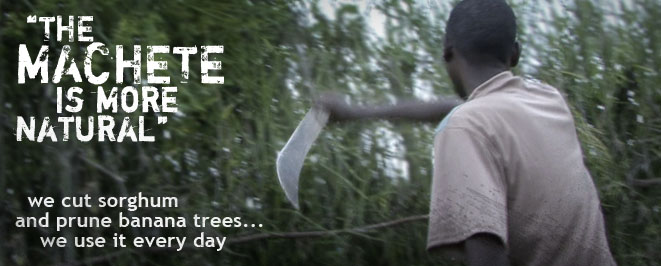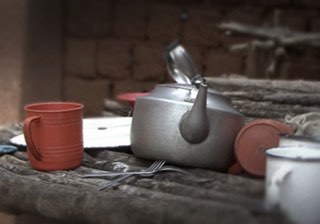Encounters with conflict and peace
The blade has nothing to say

Even women and little girls borrow the machete for small tasks, like chopping firewood. Whatever the job, the same gesture always comes smoothly to our hands. The blade, when you use it to cut branch, animal, or man, it has nothing to say.
In the end, a man is like an animal: you give him a whack on the head or the neck and down he goes. Only young guys used clubs. The club has no use in agriculture, but it was better suited to their way of trying to stand out, of strutting in the crowd. Same thing for spear and bows: those who still had them could find it entertaining to lend them or show them off.

More productive than farming

During the killings anyone with strong arms brought home as much as a merchant of quality. We could no longer count the panels of sheet metal we were piling up. The taxmen ignored us. The women were satisfied with everything they brought in. They stopped complaining.
For the simplest farmers, it was refreshing to leave the hoe in the yard. We got rich, we went to bed with full bellies, we lived a life of plenty. Pillaging is more worthwhile than harvesting, because it profits everyone equally.
"That time greatly improved our lives since we profited from everything we’d never had before. The daily beer, the beef, the bikes, the radios, the sheet metal, the windows, everything. People said it was a lucky season, and that there would not be another."
A day's work
PIO: We would wake up at six o'clock. We ate brochettes of grilled meat and nourishing food because of all the running we had to do. We met up in town, near the shops, and chatted with pals along the way to the soccer field. There they would give us orders about the killings and our itineraries for the day, and off we went, beating the bush, working our way down to the marshes. We formed a line to wade into the mud and the papyrus. Then we broke up into small bands of friends or acquaintances.
We got on fine, except for the days when there was a huge fuss, when interahamwe reinforcements came in from the surrounding areas in motor vehicles to lead the bigger operations. Because those young hot-heads ran us ragged on the job.
Looting on the way home

We killed in teams, but we looted every man for himself or in small groups of friends - except for drinks and cows, which we enjoyed sharing. And the plots of land, of course, they were discussed with the organisers. As district leader, I had got a huge fertile plot, which I counted on planting when it was all over.
Anyone who couldn’t loot because he had to be absent, or because he felt too tired from all he had done, could send his wife. You would see wives rummaging through houses. They ventured even into the marshes to get the belongings of the unfortunate women who had just been killed.
People would steal anything – bowls, pieces of cloth, jugs, religious images, wedding pictures – from anywhere, from the houses, from the schools, from the dead.
Quotes on this page from A time for machetes. The killers speak by Jean Hatzfeld. Images by Dave Fullerton
< previous page | next page >
In this section
STARTING A GENOCIDE
Whose idea was it?
How did it start?
The foreigners are leaving
Hate radio
DETAILS
Roadblocks
The little things
INSIGHT
A simple plan
This new job
A strangeness of mind
Personalities
A good man
FOCUS ON THE BUGESERA
The Bugesera
Ntarama church massacre
A day in the marshes
MZUNGUS
The role of the west
Two French missionaries
A journalist's story
THE END OF THE GENOCIDE
The refugee crisis
A country with nobody home

Whose idea was it?
How did it start?
The foreigners are leaving
Hate radio
DETAILS
Roadblocks
The little things
INSIGHT
A simple plan
This new job
A strangeness of mind
Personalities
A good man
FOCUS ON THE BUGESERA
The Bugesera
Ntarama church massacre
A day in the marshes
MZUNGUS
The role of the west
Two French missionaries
A journalist's story
THE END OF THE GENOCIDE
The refugee crisis
A country with nobody home

